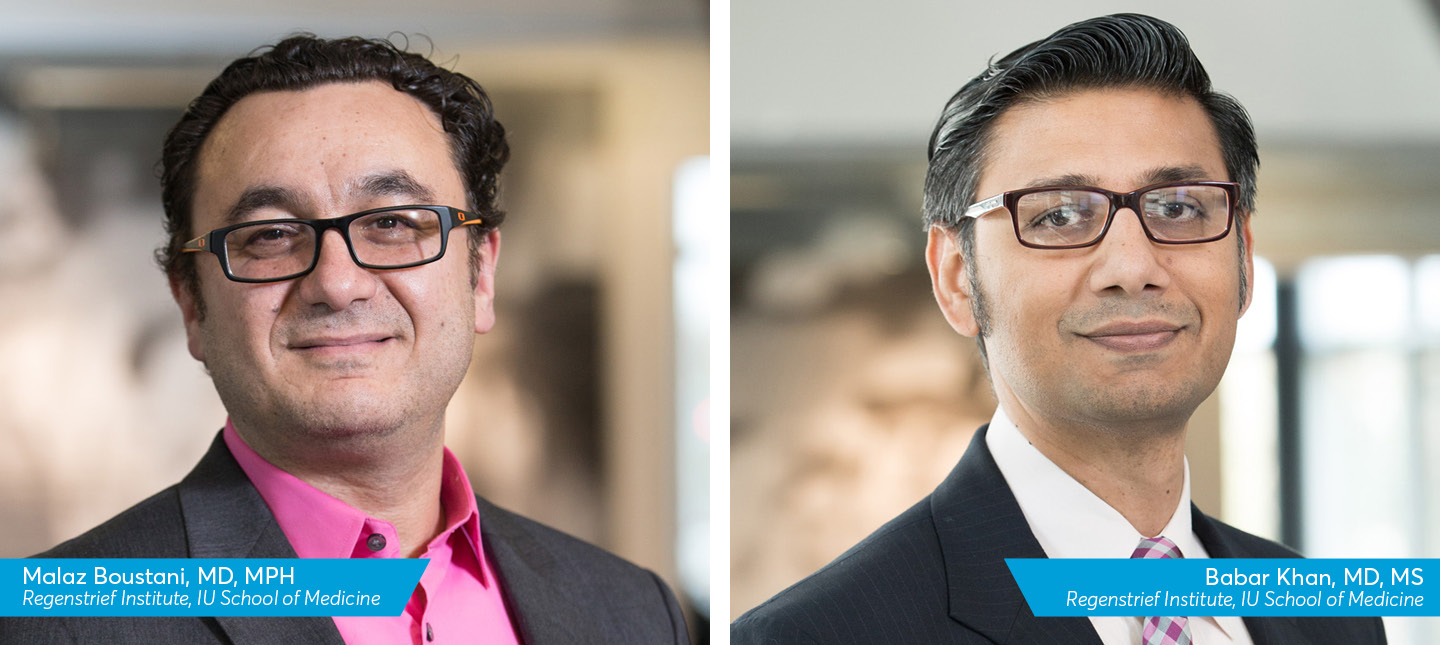Older adults who suffer serious injuries from a fall or a motor vehicle accident often have impaired long-term functioning and diminished quality of life. A new study, published in JAMA Surgery by researcher-clinicians from Regenstrief Institute and the medical schools of Indiana University and University of Wisconsin, has found the new Trauma Medical Home care model has a positive impact on older patients who had a high burden of anxiety and depression prior to their accidental injury and resulting surgery, particularly those 70 and older.
The novel Trauma Medical Home model of coordinated care, developed by the study authors, brings much needed support and resources to injury survivors after hospital discharge with the goals of improving and expediting recovery from physical or psychological injury for a better quality of life. To achieve these goals, the care model seeks to remove obstacles hindering patient-centered recovery, including poor adherence to post-hospital discharge medication and therapies, fragmented care and inadequate attention to medical, psychological and cognitive aspects of recovery from trauma.
“We found that for an especially vulnerable segment of older injury survivors — those who came to their injury with preexisting depression or anxiety — the care coordination and other resources provided by the Trauma Medical Home care model improved both their psychological recovery and their quality of life,” said study senior author Malaz Boustani, M.D., MPH, of Regenstrief Institute and the Indiana University School of Medicine. “In this study we looked at those age 50 and older and found benefit for the oldest patients in our clinical trial. Our next iteration of the Trauma Medical Home will focus on these especially vulnerable older adults, perhaps 70 or 75 years and older — not just those with pre-injury psychological vulnerability, but also those with pre-injury frailty and social vulnerability.
“The healthcare system in the U.S. is fragmented in general, especially for those who face a severe injury that requires hospitalization,” observed Dr. Boustani. “In the current healthcare transformation from volume-based care to value-based care, the fragmented nature of acute injury recovery after hospital discharge will affect the quality of care and the health outcome of patients in general and specifically the most vulnerable injury survivors. Collaborative care coordination will be able to create a win-win situation where it will help the patients and the healthcare delivery system — including clinicians and the health insurance companies — to deliver what healthcare is supposed to be — better care for all — now.”
The key component of the Trauma Medical Home is the care coordinator, a specially trained nurse supported by an interdisciplinary team of clinicians that includes a geriatrician, a surgeon, a pulmonology/critical care physician and a neuropsychologist providing on-demand advice and support. The team, along with the care coordinator and in consultation with the patient and their caregivers, co-design an individualized recovery plan.
The plan — utilizing assessments of post-injury cognitive, physical, behavioral and psychological disability and specific needs of trauma survivors — might include follow-up on hospital discharge orders, connection with community-based service providers and organizations, medication adherence and appropriateness of medications as well as overall care instructions. The care coordinator conducts patient visits and analyzes preventable rehospitalizations as well as managing and monitoring recovery care plans.
“From my perspective as both a researcher and a critical care physician, the Trauma Medical Home can provide much-needed help to patients and their families as they manage both the health effects and the many stressors of devastating and unexpected injuries over the long recovery period,” said study co-author Babar Khan, M.D., M.S., a Regenstrief Institute and IU School of Medicine researcher-clinician. “This care model could also help accountable care organizations and insurers to save money or even make money by speeding up the delivery of quality care, optimizing patient recovery and ultimately improving health outcomes — benefiting all.”
A total of 429 men and women without cognitive impairment — age 50 and older, with hip fractures from a fall, serious injuries from a motor vehicle accident or other traumatic injuries that required surgery — participated in the study. They were discharged from one of three Level I trauma centers in Indianapolis or one in Madison, Wisconsin, and were randomized to usual care or the Trauma Medical Home intervention.
Trauma Medical Home is an adaptation — for older adults with traumatic injuries — of collaborative care models previously developed by Regenstrief Institute and the IU School of Medicine researcher-clinicians that have demonstrated success in high-need medical populations including the acclaimed Geriatric Resources for Assessment and Care of Elders (GRACE) model and Improving Mood: Promoting Access to Collaborative Treatment (IMPACT) model.
The primary measure of improvement or decline of patients in both the Trauma Medical Home and usual care arms of the new study was the Healthy Aging Brain Care Monitor, a 32-item survey measuring cognitive, physical and psychological symptoms, developed by Dr. Boustani and colleagues. Each question on the Healthy Aging Brain Care Monitor indicates a specific area where help or coping strategies are indicated. Patients’ scores triggered adjustments to Trauma Medical Home care protocols.
Depression and anxiety were measured using the Patient Health Questionnaire-9 (PHQ-9) and the Generalized Anxiety Disorder scale-7 (GAD-7), both widely used mental health screening tools co-developed by Regenstrief Institute Research Scientist Kurt Kroenke, M.D.
The developers of the Trauma Medical Home note that the model has genuine potential to positively influence care delivery, speed up and optimize recovery, and improve health outcomes.
“Collaborative Care for Injured Older Adults: The Trauma Medical Home Randomized Clinical Trial” is published in JAMA Surgery. The study was supported by the National Institutes of Health’s National Institute on Aging award R01AG076489 (PI: B. Zarzaur and M. Boustani).
Authors and affiliations:
Ben L Zarzaur1, Emma Holler2, Damaris Ortiz3, Anthony Perkins4, Sue Lasister5, Sujuan Gao4, Dustin D. French6, Babar Khan7, Malaz Boustani7,8
1Division of Acute Care and Regional General Surgery, Department of Surgery, University of Wisconsin School of Medicine and Public Health, Madison.
2Department of Epidemiology and Biostatistics, Indiana University School of Public Health, Bloomington.
3Department of Surgery, Indiana University School of Medicine, Indianapolis.
4Department of Biostatistics and Health Data Science, Indiana University School of Medicine, Indianapolis.
5School of Nursing and Health Studies, Health Sciences District, University of Missouri, Kansas City.
6Department of Ophthalmology and Medical Social Sciences, Northwestern University, Chicago, Illinois.
7Department of Medicine, Indiana University School of Medicine, Indianapolis.
8Center for Health Innovation and Implementation Science, Indiana University School of Medicine, Indianapolis.
Malaz Boustani, M.D., MPH
In addition to his role as a research scientist with the Indiana University Center for Aging Research at Regenstrief Institute, Malaz Boustani, M.D., MPH, is the founding director of the Center for Health Innovation and Implementation Science. He is the Richard M. Fairbanks Professor of Aging Research at Indiana University School of Medicine – Indianapolis. Dr. Boustani is also director of care innovation at Eskenazi Health.
Babar Khan, M.D., M.S.
In addition to his role as associate director and research scientist with the Indiana University Center for Aging Research at Regenstrief Institute, Dr. Khan is also a professor of medicine and the Floyd and Reba Smith Professor in Respiratory Disease in the Division of Pulmonary Medicine at Indiana University School of Medicine – Indianapolis. In January of 2024, he was appointed the first chief of the newly created Critical Care Section – Indiana Critical Care Management and Recovery Program in the IU Division of Pulmonary, Critical Care, Sleep and Occupational Medicine.











